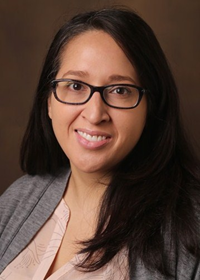Integrating EHR and Genomic Data in Women's Health Research
to

Digna Velez Edwards, Ph.D.
Professor, Obstetrics and Gynecology
Director Division of Quantitative Sciences (OB/GYN)
Director Center for Women's Health Research
Vanderbilt University Medical Center
Dr. Digna Velez Edwards is a genetic epidemiologist, Professor of Obstetrics and Gynecology and Biomedical Informatics, Director of the Division of Quantitative Sciences in the Department of Obstetrics and Gynecology, Director of Women's Health Research center, Investigator of the Vanderbilt Genetics Institute, and a member of the Vanderbilt Epidemiology Center. She has doctoral training in human genetics and has a master's degree in statistics. She started as faculty in the department of Obstetrics and Gynecology in 2010 pursuing research focused on the role of gene and environment interactions in the risk for complex diseases, with a specific interest in fibroproliferative disorders that include uterine fibroids and keloids and diseases that disproportionately impact women's reproductive health.
Since the start of her faculty appointment, Dr. Velez Edwards has developed and coordinated a repository of biospecimens from participants in the "Right from the Start" pregnancy cohort to be used for genetic epidemiology studies examining reproductive health complications and risk for adverse pregnancy outcomes. She has several ongoing research projects utilizing this resource, as well as large clinical databases that link clinical information to DNA. These studies focus on understanding the ethnic disparities in genetic risk for several complex diseases including preterm birth, miscarriage, uterine fibroids, and pelvic organ prolapse.
Summary
This lecture will cover current research and opportunities for women’s health research, data science, and genomics studies. Provided will be specific examples genetic studies focused on reproductive and gynecologic health from studies leveraging electronic health record biobanks.
Learning Objectives:
- Understand different types of data science
- Learn what research can be done with electronic health record linked biobanks
https://videocast.nih.gov/watch=55020 (external link)
This page was last updated on Tuesday, February 11, 2025